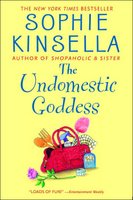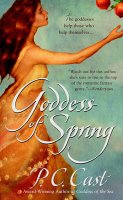 Author:
Author: Sophie Kinsella
Published: July 19, 2005 (Dial Press)
Category: Chick Lit
Quote of Choice: The great thing about legal training is it
really teaches you to lie.
Despite my deep hatred for Kinsella's
Shopaholic series, I thoroughly enjoyed this book. I actually think her stand-alone novels are far better than the series that made her so popular in the chick lit circles.
I really didn't like
Shopaholic because of the main character, Becky. She had no common sense and never learned from her mistakes. Therefore, each book was a repetition of the previous one. She'd constantly buy all kinds of crap and try to hide it, and then get into a lot of debt, and by some windfall, get out of the mess. There was very little substance to the books and I felt like it was a constant prattling of high end brand names.
All right, this isn't about Becky and her shopping problems. This is about Samantha Sweeting, top associate at one of the most prestigious law firms in London. She works 14 hours a day and is chained to her job 24 hours a day by cell phone and Blackberry. For example, when she went to a spa for a relaxation treatment (a birthday gift that was about to expire from almost a year of non-usage), she hid her Blackberry in her paper panties.
On the day Samantha is to be made the youngest partner in the history of her firm, she discovers a horrible mistake. She neglected to register a loan for 50 million quid and panicked, realizing that her career would never recover from the mistake and went into shock. Samantha left the firm and got on a random train, winding up somewhere in the English countryside. She walked up to a house and into an interview for a housekeeper's position... and gets hired.
She lied in the interview about being a Cordon Bleu trained chef and working for her friend (the one who gave her the spa gift certificate and always said Samantha worked too hard), Lady Edgersley. Of course, since Samantha never had the time to learn how to turn on an oven, make a sandwich, or use a vacuum, she wasn't doing so well when she first started her job.
I almost stopped reading the book when Samantha decided to order gourmet sandwiches to cover her lack of cooking skills, then £800 replacing the wardrobe that she turned pink in the wash, and £3 per shirt for ironing by some village girl. However, Samantha learned how to cook and clean, thanks to Nathaniel, the cute, yet intelligent and sensitive, gardener. He made himself memorable to me when he saw Samantha's burned chickpeas coming out of the oven.
"Are those rabbit droppings?"
Nathaniel introduced Samantha to his mother, who spent weekends teaching her how to cook and clean. During these weekends, Samantha's jittery, twitchy soul began to heal. As a lawyer, she had been living her life in six-minute increments. Every minute was to be packed with activity, lest it be wasted. However, after venting her frustration over waiting for bread dough to rise (she questioned the point of waiting for the rise because it wasn't worth her time), Nathaniel's mom put the warm finished loaf in Sam's hands, saying that she created that bread. That small accomplishment meant more to Sam than the seven years she had poured into the law firm of Carter Spink. This law firm wiped Sam from every business deal Sam had led, giving the credit to other people rather than soil their website with the embarrassment of Samantha. It was like she never existed to them. In her time as a housekeeper, Samantha became a human, rather than the husk she had been for a decade.
Of course, Samantha never made that mistake. She discovers a financial scam and clears her name. However, when Carter Spink offers her full equity partnership, apparently unheard of, she rejects it in favor of being a housekeeper. Then the story leaks out with huge headlines saying things like, "Promising lawyer would rather clean loos than work for Carter Spink," making CS look quite the fool. From what I hear, these kinds of prestigious law firms say that they don't treat their associates like resources to be milked to the last drop. Samantha's choice shot Carter Spink's humane associate treatment motto into the ground.
So in the end, Samantha has to choose between an even more generous offer to become a partner, or have a life where she can be happy and fulfilled. It is true that I enjoyed this book so much because of the whole, "I'd rather do something else than be a lawyer" thing. After all, I did choose to leave law school and take up publishing instead, despite the very low salary. You have to do what makes you happy, and I knew that I wouldn't be happy as a lawyer.
 Author: John Bellairs
Author: John Bellairs



